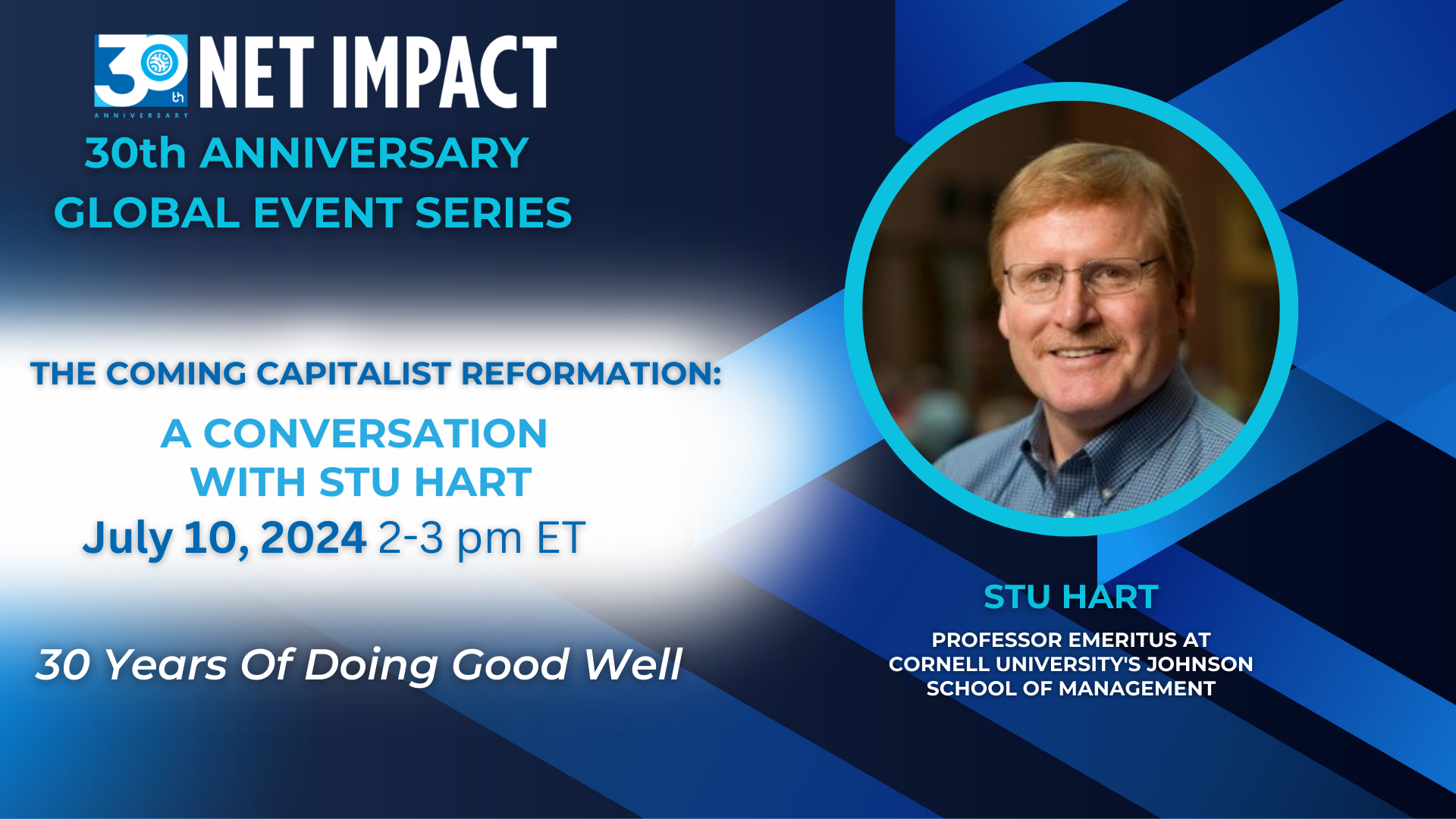ICYMI: The Coming Capitalist Reformation: A Conversation with Stu Hart

This week, I had the pleasure of speaking with Net Impact CEO Karen Johns about my latest book, “Beyond Shareholder Primacy: Remaking Capitalism for a Sustainable Future,” which was released in April.
Our conversation focused on three pillars: The recent historical context of the responsible business movement over the past 30 years, the longer, 400-year history of capitalist evolution of the “pendulum-swinging” between cycles of extractive capitalism and spurts of progressivism, and the transformative strategies that impact practitioners can use to accelerate the responsible business movement in their organizations today. While I won’t recap the hour long conversation from the event in this blog, there were several questions from the audience that we did not have time to get to that I wish to address in this blog.
If you missed the virtual event and would like to watch the recording, you can view it here: The Coming Capitalist Reformation: A Conversation with Stu Hart.
Questions From the Audience:
What is the role of other movements in this space such as the Wellbeing Economy Alliance/ workers rights/ unions?
I think these so-called “other movements” are really part of the same overall countermovement against shareholder-first capitalism—what I refer to in the book as the movement for Sustainable Capitalism. Indeed, Marjorie Kelly’s new book, Wealth Supremacy, focuses on the importance innovating ownership and governance structures through ESOPs, Co-Ops, benefit corporations, and especially emerging forms of “steward ownership” like perpetual purpose trusts to reinventing capitalism. If we are to realize a truly sustainable form of capitalism, then employees and workers must be elevated and rewarded as the key resource they really are to business success. As Kelly says, we must stop categorizing workers and employees as expenses to be minimized and instead recognize that they really are the company. Thought leaders from earlier times (for example, Adoph Berle and Gardiner Means 1933 book The Modern Corporation and Private Property) recognized that shareholders should take a backseat to other stakeholders that are more significant to the success of companies, with employees and workers heading that list. In their words, shareholders “invest not, manage not, nor do they accept liability.” They should therefore receive only the “wages of capital.”
What are your views on the “degrowth movement,” spurred in part by MIT systems thinker Donella Meadows’ 1972 book “The Limits to Growth”?
The degrowth movement is, in my view, also part of the larger countermovement against shareholder primacy capitalism. Degrowth thinking takes the argument perhaps a few steps beyond what is usually discussed by those focused on “sustainable business” by challenging the core logic of capitalism itself. In their view, capitalism is premised on taking more from nature and from labor than it gives back. As Jason Hickel asserts in Less is More, “under capitalism, growth always requires new frontiers from which to extract uncompensated value. It is, in other words, intrinsically colonial in character.” These conclusions run directly counter to some of the most recent thinking about sustainable business by people like Paul Polman and Andrew Winston who assert that business can (and must) transform itself to be “net positive”—to give more than it takes. My own view is that capitalism as an economic system is highly adaptable. Like water, it conforms to the shape of its container. The “hardware”—the corporate form—is not the main problem. Indeed, the joint-stock, limited liability corporation has been an incredibly resilient organizational form dating back to the 16th century. The problem is the “software”—the operating system for the corporation—and for capitalism itself. To realize a Sustainable Capitalism, we must rewrite the software by redefining the meaning of value itself.
How do you see AI in the responsible business/sustainability context?
Like any significant new technology, AI has the capacity for great good as well as great harm. In the context of sustainable business, I think AI can be of great benefit moving forward. Already it is being applied by innovative new companies to address the challenges associated with climate risk and just transition. Many companies have set net zero carbon goals for 2050 but have little in that way of strategies or pathways for getting there. Companies like Vyzrd are now applying AI to help move beyond mere goal-setting, reporting or carbon accounting to offer data-based and scenario-based strategic pathways for achieving net zero in a manner that optimizes financial results at the same time. Given its ability to synthesize the massive amounts of publicly available data with specific company-based data, AI can be a catalytic force in accelerating decarbonization and the transition to a truly sustainable and just world.
About the Author
Stuart L. Hart is Professor Emeritus at Cornell University's Johnson School of Management, where he founded the Center for Sustainable Global Enterprise, and Professor in Residence at the University of Michigan's Erb Institute for Global Sustainable Enterprise. He is also co-founder and former Director of The Sustainable Innovation MBA program at the University of Vermont's Grossman School of Business. A Fortune 500 consultant, Hart is one of the world's top authorities on the implications of environment and poverty for business strategy. He is the author of numerous publications, including the influential book, Capitalism at the Crossroads, 3rd Edition: Next Generation Business Strategies for a Post-Crisis World.
His new book is, Beyond Shareholder Primacy: Remaking Capitalism for a Sustainable Future, available on Amazon.




